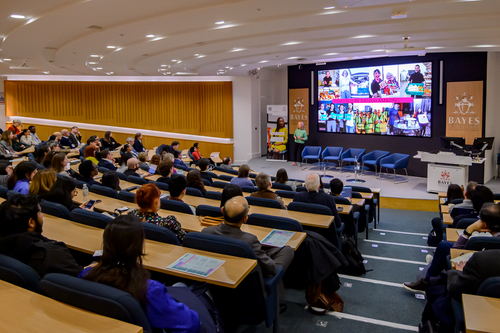By Chris Mahony (Senior Communications Officer), Published
Entrepreneurs, funders, academics and students met at Bayes Innovate 2024 this week to consider how AI is reshaping entrepreneurship.
Welcoming participants, Bayes Executive Dean Professor Andre Spicer noted that the business school has evolved since its formation in the 1960s to now have a particular strength in entrepreneurship – including tech – and Fintech.
“Like many business schools we were founded to address a productivity gap by developing new styles of management that would be a move away from what we might call the David Brent type of management. Let's say there's still a task ahead of us on that."
After developing many of the leaders in finance who shaped the modern financial markets in the City of London, over the last 30 years, Professor Spicer said, Bayes has boosted its entrepreneurship expertise. The School’s MBA programmes are ranked second globally for their entrepreneurship content and support and Bayes has embraced the Fintech sector - much of which is based on its' doorstep.
Nothing to fear but fear itself?
Recalling a recent debate he had participated in at Cambridge, Professor Spicer said the surprisingly upbeat conclusion was that AI will not be as destructive as the grimmest predictions suggest.
“The general conclusion was that while there are risks, we can overcome them and look at the opportunities.”
He noted the school also hosts the Centre for Creativity enabled by AI (CebAI), a national resource aimed at harnessing artificial creativity to do creativity better.
“We also have many academics here in the room specialising about how we can harness AI to do things like build new business models, optimise supply chains, make healthcare better and many other things,” he said.
Organiser Aurore Hochard, Head of Entrepreneurship at Bayes, pointed to concerns around jobs and ethical issues but said that much discussion so far had tended to “just scratch the surface”.
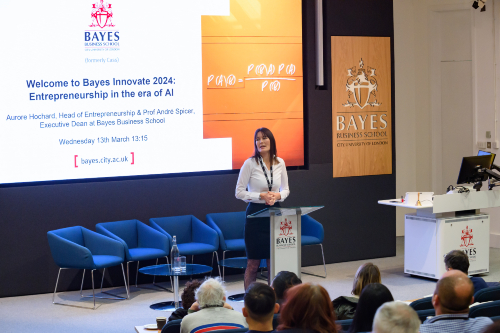
She continued: “Technology is evolving at such a pace that entrepreneurs need to keep up and keep training to remain competitive. So, there are a lot of pros and cons and things that we can explore through talks, panels, and workshops.”
AI and the human condition - a guided tour of our deepest fears?
One panel discussion explored Fintech firms leveraging AI in pursuit of human well-being.
Moderator Dr Paulina Roszkowska, Lecturer in Finance and Senior Researcher at Bayes’ Mergers & Acquisitions Research Centre, kicked the session off by testing audience willingness to place legal or health concerns in the hands of AI software. While a majority indicated they would trust the technology to handle a legal issue, rather fewer people suggested they would do so with a health concern. Almost none would turn to AI for help with a mental health problem.
Turning to the panellists, Dr Roszkowska asked if AI was friend or foe in terms of fostering human wellbeing.Stefano Goria is co-founder and CTO at Thymia Limited, which uses machine learning and neuropsychology to provide AI powered mental health assessments to identify underlying symptoms accurately and objectively.
He said: “In mental health, I see AI as a friend, but please be careful. Many claim they're 'doing' AI, but really, they're just 'using' it: there's a big difference in terms of safety. Companies providing mental health support should build their own AI models and ensure they pass strict certification. In short, AI can aid mental health, but it must be used responsibly .”
Stella Smith, CEO and founder of pirkx, an online health portal that provides members with access to a suite of wellbeing benefits, including 24/7 private GP and counselling services and virtual physiotherapy.
She said: “I definitely understand the concerns around the use of AI but, as my team use it day-to-day, I would say AI is definitely a friend. In our case, it means 16,000 people get access to affordable basic healthcare resources.
”The technology is used in her company, she says, almost like an additional employee, freeing up time for more focus on activities humans are best at. My job as CEO is delivering cost efficient services. I embed AI into the infrastructure and how we operate as a team. It is perhaps scarier for Stefano because he delivers services while we just provide access to services – AI makes our distribution easier. However there is a human-to-human element for mental health in particular.”
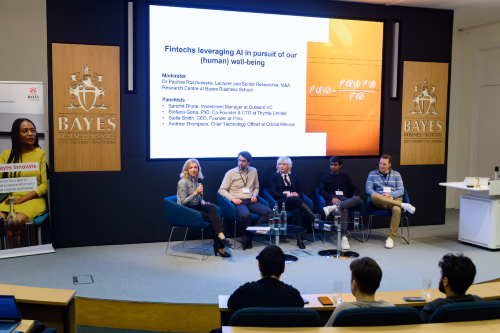
Andrew Thompson, CTO at Orbital Witness, a legal tech start-up focussed on real estate due diligence, said: “It is very much a friend. I and my team are engineers. AI is just another string in our bow for building software. It’s a very interesting string but we are still figuring it out as a company, as an industry and as a sort of global community.”
Sanchit Dhote, Investment Manager at venture capital firm Outward VC, said: “I would take the friend or foe question on further. I would probably say AI can be your best friend in a way. I've seen numerous examples of this recently in my own personal and professional life.
More specifically in the financial services and fintech context, I think you already see applications where AI has the potential to revolutionise areas like risk assessment and customer service. However, biases and bad data can definitely turn it into a foe very quickly. I think that monitoring that is the job of the regulators, investors and the wider community, including the people in this room.
Asked by Dr Roszkowska whether venture capital funders consider human wellbeing given their “focus” on returns, Sanchit said: “Getting returns for our investors is our number one priority.
"However, our investment philosophy goes well beyond that. Look at our current investments and there is a clear theme around democratisation of financial services. What that really means is we are looking to back companies that are breaking down barriers and creating opportunities to improve or provide greater access to financial services.”
Andrew said that his firm’s technology sought to pick out “the real red flags” that lawyers and paralegals need to be aware of in the possibly thousands of pages of documents involved in the purchase of one house.“It's basically finding an automated process to do that efficiently to the same level of quality that lawyers or paralegals would do it and obviously lawyers have an incredibly high bar,” he concluded.
Stefano noted that AI technology in healthcare was building on recent digitalisation such as computerised records and online consultations – with the latter going mainstream during the covid pandemic.“Now we and others are building technology that is not just automating away tasks, but is doing things that humans alone cannot do to the same effect. In particular we are working with biomarkers for mental health symptoms that historically were not objective.
The mainstream way to identify symptoms and conditions has been questionnaires – which means asking people many questions and trusting the individual to be truthful.“In the US in particular people will tend to report higher scores of depression to get access to medication more quickly so there is a pressing need for an objective way of measuring it. And we believe that AI can actually speed up the process a lot.”
This, he said is “just a fraction of the universe of possibilities of what AI can do for us”.
We have been here before - sort of
Dr Dimitris Paraskevopoulos, Reader in Operations and Supply Chain Management at Bayes, led an interactive session around how big data and machine learning change business. He used as a case study the development of analytics deployed in 1990 to offer America’s first credit card with different interest rates and terms depending on customers’ risk profile.
Initially, the data profiling had to be tested randomly to identify risk factors – leading to losses that agitated shareholders. Eventually, however, the credit card business created a spin off which is the hugely successful Capital One.
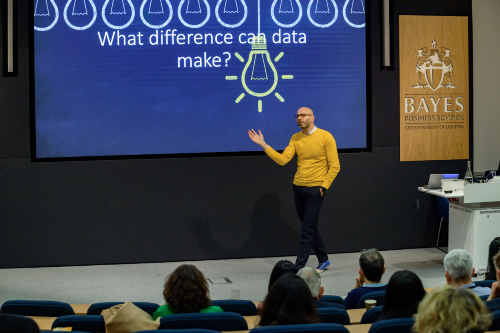
A history of human hubris
Keynote speaker David King, co-founder and co-CEO of Artificial, a provider of algorithmic underwriting technology to Lloyd’s and global insurance markets, emphasised that – as with other digital technology – humans often resist the idea that computers can be “smarter” than them.
He pointed to then world chess champion Garry Kasparov’s claim in 1989 that a computer would never beat him – a boast proved wrong within seven years.
David said: “I think the lesson that I learnt from that, and what we see every day with commercial insurers that we partner with, is that people do not believe that computers or a blend of computers and humans can produce better results than what they are doing at the moment. It doesn't matter if we point to all the fantastic things that Elon Musk does with computers in making a rocket land on its launch pad. They perceive their specific case as unique.
“As an entrepreneur you need to be laser focused on the individuals that you're working with and making their life better, improving their profitability or their businesses. Otherwise, it doesn't matter how good the tech is, the people just won't change how they work.”
Despite a punishing workload and high-profile clients, David said, it was very much an unexpected and unusual 15 minute meeting with a key decision maker that finally delivered success in the commercial insurance industry. He and his business partner had initially thought that their product and location in London meant they were well-placed to stand out to a range of customers, David said.
“It wasn't until we laser focused on a specific set of people that we could differentiate ourselves to, that we really got traction in commercial insurance.”
A big break from an unexpected quarter
Following what David says was the closest he ever came to a “Dragon’s Den” moment with a key decisionmaker in a London pub, he and his business partner worked through the night to come up with a solution using their technology to address the challenge set by the decision-maker.
While AI technology was not as accessible to “the masses” in 2019, David says, it was possible to do algorithmic underwriting in “some shape or form”.
“But the timing wasn’t right because people didn't want to do it and they didn't believe that it transformed their business, loss ratios or expense ratios.”
Although his company has now raised more than £22 million, David said there were a lot of very difficult conversations seeking venture capital funding – again partly due to timing.
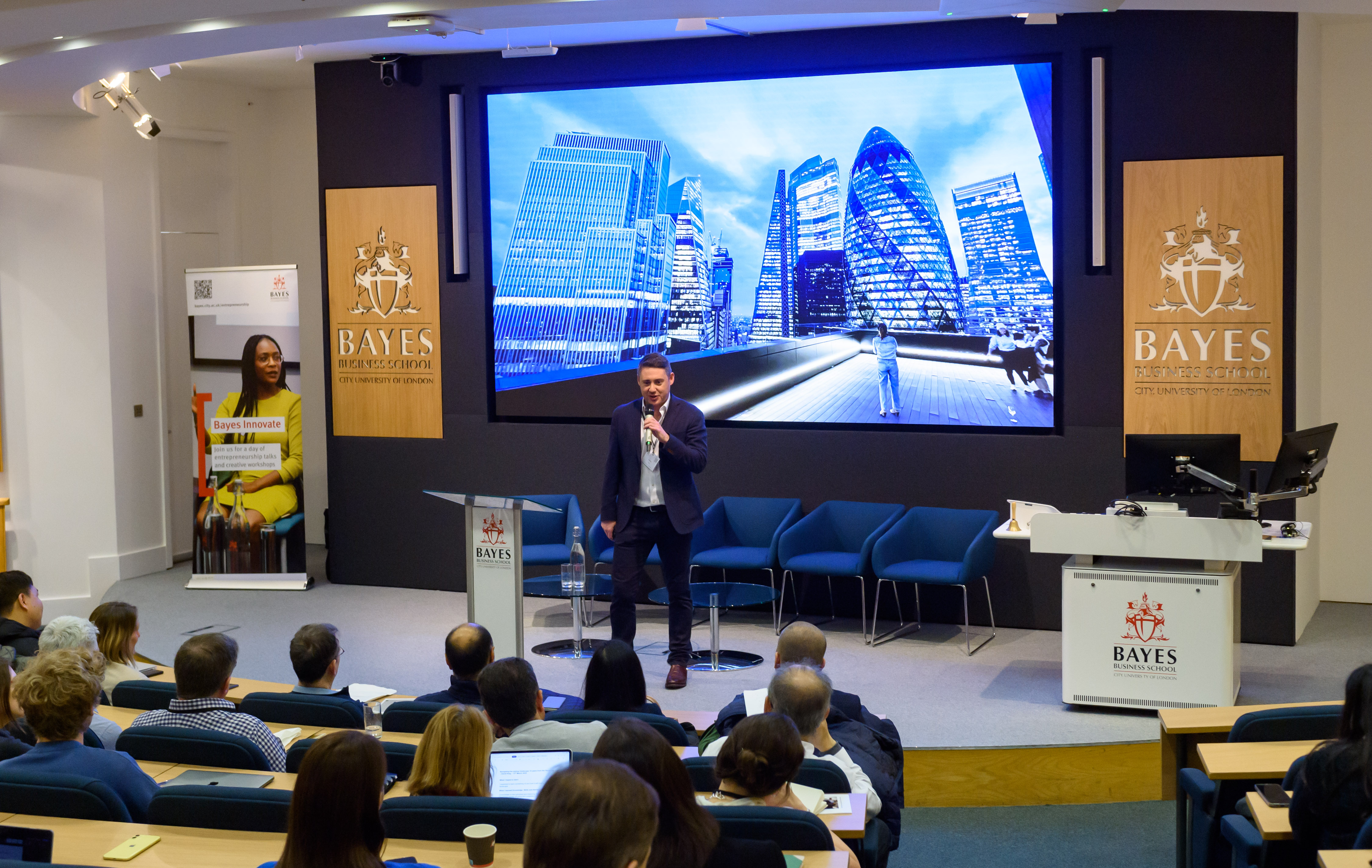
“Timing was a key challenge on the venture capital front in exactly the same way as with the tech and commercial partners. We had to find potential funders that wanted to be with us on this journey and really believed in it. It wasn’t until we honed in on what the individual venture capital funds really want to see that we got traction – a clear pathway to a billion pound company.”
He cautioned students and others to expect that any venture capital funding round is likely to have a 2 per cent success rate, and anything above that is a bonus.
“It had taken us years of persistence. I think if you're doing the right things, but the timing is off, you're really going to struggle on your entrepreneurial journey.”
“If you see 50 companies the struggle is being told ‘no’ 49 times.”
Responding to a question from the audience, David said venture capital funders usually have a checklist that entrepreneurs can prep for.
"Associates might ask how co-founders met, the market and the length of sales cycles etc. And partners like trends, and a clear path to returning the funds. It helps to look at what they’ve invested in historically.
Insurers are currently using AI to structure and format a “morass of messy data” so they can significantly reduce costs and promote efficiency.
It is also being used, David said, to support commercial underwriting decisions but, as in the past, it is meeting “friction” from underwriters who do not swiftly accept that “the computers” can shape better decisions. A human, augmented by AI, “can absolutely produce better decisions, but you need to prove it with data”.
“You're capturing human insight over time and then helping humans to deploy it rapidly at scale. However, if CEOs, decision makers or individual underwriters don’t believe in it – maybe because it requires them to invest time or because it’s not affecting their bonus at the end of the year – then you’re flummoxed if you’re an entrepreneur or entity trying to sell them these tools."
You can contact the event organiser, Head of Entrepreneurship Aurore Hochard, at aurore.hochard@city.ac.uk
Tw: @aurorehochard

